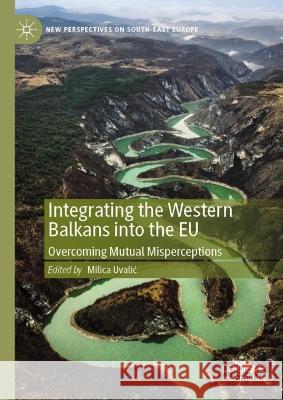Integrating the Western Balkans Into the Eu: Overcoming Mutual Misperceptions » książka



Integrating the Western Balkans Into the Eu: Overcoming Mutual Misperceptions
ISBN-13: 9783031322044 / Angielski
Integrating the Western Balkans Into the Eu: Overcoming Mutual Misperceptions
ISBN-13: 9783031322044 / Angielski
(netto: 575,06 VAT: 5%)
Najniższa cena z 30 dni: 501,19
ok. 16-18 dni roboczych.
Darmowa dostawa!
Chapter 1. Milica Uvalic (University of Perugia, Italy): The deteriorating mutual perceptions of the European Union and the Western Balkans (Introduction and overview)
Part I. Perceptions from the West
Chapter 2. Will Bartlett (European Institute, London School of Economics, UK): How perceptions and misperceptions influence the allocation of European overseas development assistance (ODA) to the Western Balkans
Chapter 3. Renzo Daviddi (former EU official): Moving Bosnia and Herzegovina towards European Union membership: a daunting task
Chapter 4. Stefano Bianchini (University of Bologna, Italy): Yugoslav partition and post-war EU integration: The role of Italy, 1990-2022
Chapter 5. Dušan Reljić (SWP - German Institute for International and Security Affairs, Berlin/Brussels): Why EU enlargement in southeast Europe came to nothing. A view from GermanyChapter 6. Dejan Jović (University of Zagreb, Croatia): Imagining Europe in a new and small state: the case of Croatia
Chapter 7. Ivan Vujačić (University of Belgrade, Serbia): The US in the Western Balkans: reluctant, late and distant involvement
Part II. Perceptions from the region
Chapter 8. Jovan Teokarević (University of Belgrade, Serbia): The image of the European Union in the Western Balkans
Chapter 9. Jelena Džankić (European University Institute, Florence): Perceptions and misperceptions of EU conditionality in the Western Balkans: a case of a ‘capability-expectations gap’?
Chapter 10. Odeta Barbullushi (University of Tirana, Albania): The EU and the Western Balkans: A strategic relationship, in need of renewed trust and enhanced engagement
Chapter 11. Srđan Bogosavljević (University of Belgrade): The foggy future of the Balkans in or out of the EU
Part III. Perceptions from individual countries
Chapter 12. Ditmir Bushati (University of Tirana, Albania): The European Union and the Western Balkans, an endless story. The case of Albania
Chapter 13. Nedžma Džananović Miraščija, Jasmin Hasić, Margareta Rončević (University of Sarajevo, Bosnia and Herzegovina): Mis-coordinated integration mechanisms: The role of the EU agents in decelerating accession progress of Bosnia and Herzegovina
Chapter 14. Gëzim Krasniqi (University of Edinburgh): Pro EU, no matter what: EU (mis)perceptions in Kosovo
Chapter 15. Gordana Djurović (University of Podgorica, Montenegro): The perception of the EU and its policies through European integration SWOT analysis. A view from Montenegro
Chapter 16. Simonida Kacarska (European Policy Institute, Skopje, North Macedonia): Reinforcing or conflicting? Conditionality and political socialization in the EU accession process in the Republic of North Macedonia
Chapter 17. Aleksandra Krstić (University of Belgrade, Serbia): Love and hate relationship: media framing of the official political communication about the EU in Serbia’s media
Chapter 18: Milica Uvalic (University of Perugia, Italy) and Will Bartlett (European Institute, London School of Economics, UK): Bridging the gap in European Union – Western Balkan perceptions
Milica Uvalic is Professor at the University of Perugia, Italy. She was also member of the UN Committee for Development Policy and Assistant Minister in the first post-Milošević government in FR Yugoslavia. Recent publications include Towards Economic Inclusion in the Western Balkans coedited with W. Bartlett (Palgrave, 2022) and The Economic and Investment Plan for the Western Balkans co-authored with W. Bartlett and M. Bonomi (European Parliament, 2022).
Only Milica Uvalic could gather such a stellar group of authors on relations between countries in Southeastern Europe and the European Union; their wide range of perspectives is both timely and extremely valuable for scholars and policy makers alike.
---Susan L. Woodward, The Graduate Center, City University of New York, USA
This book is crucial reading for anyone who wants to understand why it is taking so long to integrate the Western Balkans countries into the European Union. It addresses the misconceptions on both sides by scholars from a variety of disciplines, providing real understanding and insight.
---Saul Estrin, London School of Economics, UK
1997-2026 DolnySlask.com Agencja Internetowa
KrainaKsiazek.PL - Księgarnia Internetowa









